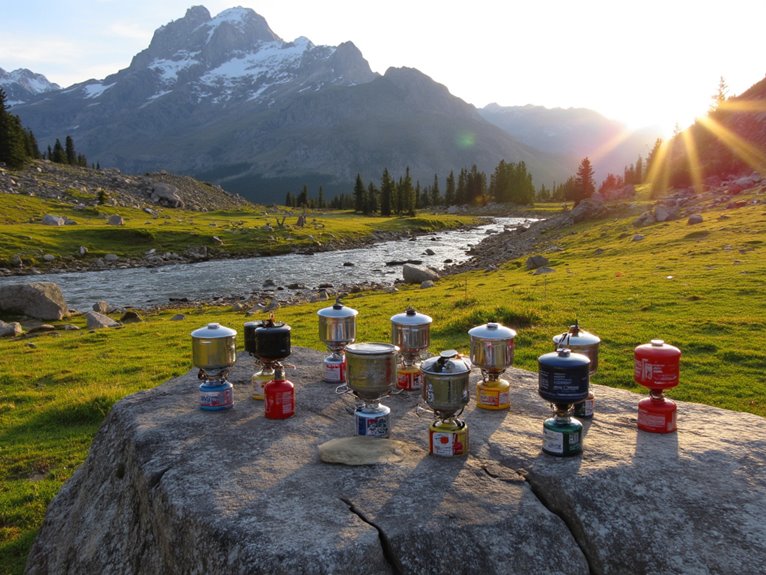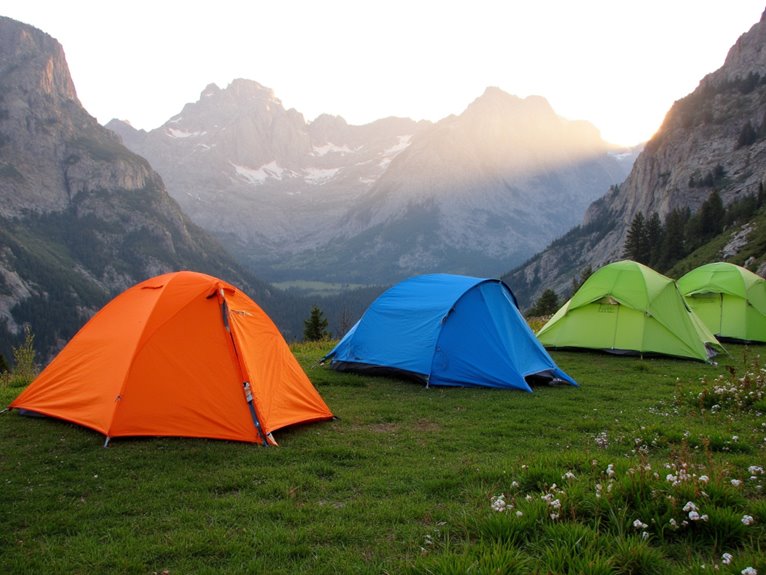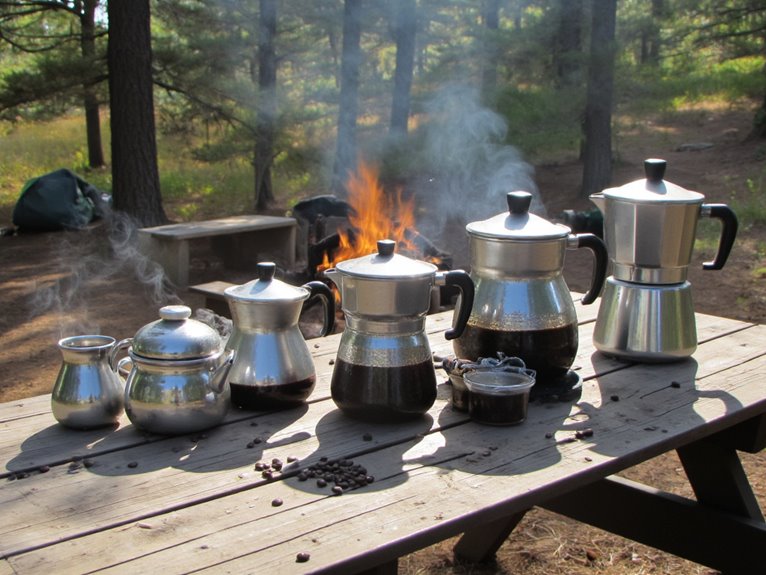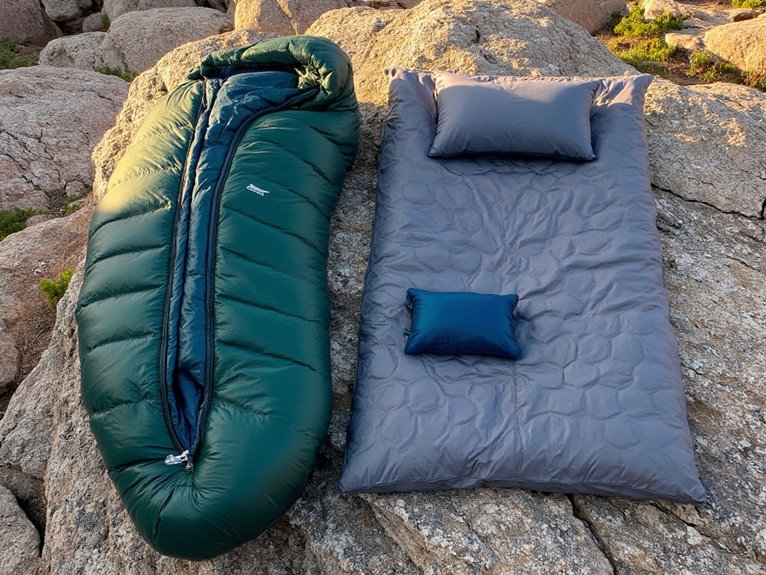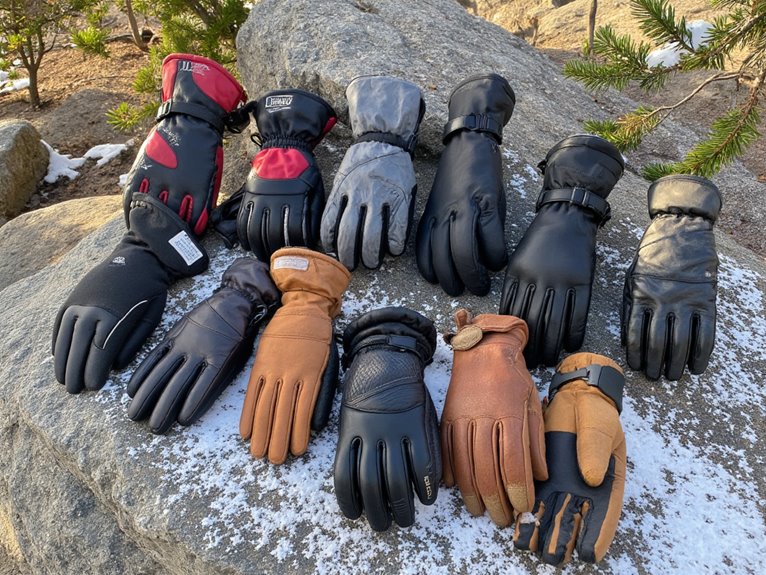How Much Food for a 7 Day Camping Trip?
For a 7-day camping trip, plan for 14-21 pounds of food per person, depending on physical activity level. Daily caloric needs range from 1,800 to 3,000 calories, considering age, sex, weight, and activity level. Incorporate high-calorie, high-protein options like energy bars, nuts, and dried fruits, as well as lightweight breakfast options like instant oatmeal and energy bars. Packing and storing food efficiently is vital; use airtight containers, pack heavy items first, and label items by meal and category. By considering these factors, you'll be well-prepared for your trip, and there's more to discover on meal planning and food storage strategies.
We are supported by our audience. When you purchase through links on our site, we may earn an affiliate commission, at no extra cost for you. Learn more. Last update on 15th January 2026 / Images from Amazon Product Advertising API.
Calculating Food Needs Per Person
To accurately plan meals for a 7-day camping trip, it's essential to calculate the daily caloric needs of each person, taking into account factors such as age, sex, weight, and activity level.
This calculation will help determine the required amount of food per person. A general guideline is to allocate 2-3 pounds of food per person per day, depending on the level of physical activity.
For a 7-day trip, this translates to 14-21 pounds of food per person. Additionally, consider the type of activities planned, such as hiking or swimming, which may require more calories.
Considering Caloric Requirements
When planning meals for a 7-day camping trip, it is vital to ponder the caloric requirements of each camper.
This involves calculating daily caloric needs, taking into account individual energy expenditure factors such as age, sex, weight, and activity level.
Daily Caloric Needs
Determining daily caloric needs is crucial for a 7-day camping trip, as it directly impacts energy levels, physical performance, and overall well-being.
A general guideline for daily caloric intake is 2,500-3,000 calories for men and 1,800-2,000 calories for women.
However, this can vary depending on individual factors such as age, weight, and activity level.
A more accurate estimate can be made using the Harris-Benedict equation, which takes into account basal metabolic rate and activity level.
This calculation provides a more personalized estimate of daily caloric needs.
Energy Expenditure Factors
Calculating energy expenditure factors is essential to accurately estimate caloric requirements, as these factors substantially influence an individual's daily energy needs during a 7-day camping trip.
Age, sex, weight, and height are primary factors affecting energy expenditure. For example, older individuals or those with a higher percentage of body fat may require fewer calories, while younger, more active individuals may need more.
Additionally, climate, terrain, and activity level also impact energy expenditure. For instance, hiking in hot and humid environments or engaging in high-intensity activities like rock climbing will increase energy needs.
Accounting for Activity Levels
As you plan your camping trip, it's essential to consider the varying levels of physical activity you'll engage in each day, as this will significantly impact your daily caloric needs and, subsequently, the quantity of food you'll need to pack.
To accurately estimate your energy needs, consider the following factors:
- Light activity: Hiking, fishing, or casual walking (1.5-2.5 calories/minute)
- Moderate activity: Backpacking, swimming, or bicycling (3-5 calories/minute)
- High activity: Rock climbing, whitewater rafting, or intense hiking (5-7 calories/minute)
- Extremely high activity: Marathon running, triathlon, or extreme sports (7-10 calories/minute)
Planning Meals and Snacks
When planning meals for a camping trip, consider high-calorie, high-protein options like energy bars, nuts, and dried fruits.
For breakfast, instant oatmeal or energy bars are convenient and lightweight.
Lunches can consist of peanut butter and jelly sandwiches, crackers, and canned goods like tuna or chicken.
Dinners can be pre-cooked meals like freeze-dried entrees or dehydrated soups.
Snacks like trail mix, dried fruits, and jerky are also essential.
Don't forget to pack plenty of water or a water purification system to stay hydrated.
Storing and Packing Food
Proper food storage and packing are essential to maintaining freshness, preventing spoilage, and ensuring a safe and enjoyable camping experience. When storing and packing food, it's crucial to consider factors such as temperature, moisture, and accessibility.
Use airtight containers: Store dry goods like grains, nuts, and snacks in airtight containers to keep them fresh and protected from the elements.
Pack heavy items first: Place heavier items like canned goods and bottles at the bottom of your pack to ensure stability and balance.
Keep cold items cold: Store perishable items like meat, dairy, and eggs in insulated coolers with ice packs to maintain a safe temperature.
Label and organize: Clearly label and organize your food items by meal and category to ensure easy access and minimize food waste.
Dealing With Food Waste
When venturing into the wilderness, it's essential to weigh the environmental impact of food waste on the ecosystem.
To minimize the ecological footprint of our camping trip, we'll delve into strategies for reducing food packaging, employing meal planning tactics to avoid excess food, and implementing proper food storage techniques to prevent spoilage.
Reducing Food Packaging
To minimize the environmental impact of their 7-day adventure, campers can adopt a 'pack in, pack out' mentality, where all trash, including food packaging, is carried out of the campsite and disposed of properly.
To reduce packaging waste, campers can choose products with minimal or biodegradable packaging.
Additionally, buying in bulk and portioning out meals is another effective strategy.
Selecting items with refillable containers can also make a significant difference.
Finally, avoiding single-serving packets and opting for larger quantities can further reduce waste.
Meal Planning Strategies
Careful meal planning is essential to minimizing food waste, as it enables campers to prepare only what they need, reducing the likelihood of excess food and packaging.
By planning meals in advance, campers can create a detailed shopping list, avoiding unnecessary purchases and subsequent waste.
It's also vital to take into account the campsite's cooking facilities and available utensils when planning meals.
Additionally, campers should plan for flexibility in their meal plan, allowing for adjustments based on changing weather conditions or unexpected delays.
Proper Food Storage
Proper food storage is critical to preventing spoilage and waste, as it helps maintain the quality and safety of food throughout the camping trip.
When stored improperly, food can spoil quickly, leading to waste and potential health risks.
To avoid this, follow these essential storage tips:
Keep it cool: Store perishable items like meat, dairy, and eggs in insulated coolers with ice packs to maintain a temperature below 40°F (4°C).
Use airtight containers: Store dry goods like grains, nuts, and dried fruits in airtight containers to preserve freshness and prevent contamination.
Label and date: Label each container with its contents and date to ensure you consume the oldest items first.
Store properly: Keep food and trash in sealed containers and store them in airtight bins to prevent attracting wildlife.
Last-Minute Food Checklist
A last-minute food checklist guarantees that you haven't forgotten any essential items, saving you from the inconvenience of a hungry and unhappy camping group.
Before departing, review your checklist to verify you have all necessary food and cooking supplies.
Verify that you have sufficient non-perishable items, such as energy bars, trail mix, and canned goods.
Don't forget perishable items like meat, dairy products, and fruits, which require proper storage and handling.
Check that you have adequate cooking gear, including utensils, pots, and pans.
Finally, double-check that you have sufficient water and a water purification system, if necessary.
A thorough checklist will confirm a well-stocked and enjoyable camping trip.

